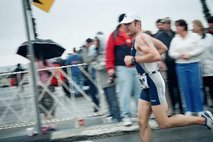While I live in near luxury here, we do not have cable television and was not afforded the luxury of watching Beckie compete last night. From what I can gather, she did very well and should be proud of her accomplishment... sixth place in the world. Let me see - the approximate population of the world is somewhere around 6.5 billion people - so that makes her a faster skier than basically everyone on the planet. Worth a medal, surely, but I guess not in that race.
Athletics is a difficult endeavor - when you break it down, there is a lot to consider... namely, how do you judge your performance? This seemingly simple problem does not have a simple resolution... a race is simply a snapshot of a moment in time. You have control over some of the conditions leading up to the race, but you are largely out of control of most of the factors affecting the outcome.
So, one must ask themselves - how do we measure ourselves?
The obvious first answer is to judge based on placing. This is a flawed measure of performance, if for no other reason than you cannot control whom you are racing against. Obviously in the case of me versus a world champion triathlete, I would lose, so winning is hardly a reasonable measure. Beyond this, if you are all world champions, there are many other factors that come into play - including health and wellness, mental condition, weather, the alignment of the moon, and so on. The list goes on, and it really boils down to the day - is it the perfect day, or not quite so perfect? If it's not perfect for you, it may well be perfect for the next guy. Should you be content with your performance? Probably so, but we just never are...
Flawed method number two is to judge based on time - otherwise referred to as a personal best (PB) or personal record (PR). Now, the first problem with judging your performance on time alone is that there are no two courses alike, and even if you race on the same course, no two days are the same (see above). Thus, even time is only a rough guauge of performance on a given day. Course variances, including terrain, and ill-measurement are just a couple of examples that can go wrong with comparing two similar distance races. This is a better method than placing, but hardly perfect.
So, how should one reflect on a day of competition? While everyone else is expecting medals, placings, PR's or world records, our focus as athletes should be on feel. Not heart rates, not finish times or placings, but how did we FEEL that race went.
We all know the difference between a "good race" and a "crappy race" are, and if we fight a good battle to the end, we know it. If we came up short in the other areas - so what? We left what we had on the road, and that's truly what matters. I think that this is one of the most important things that I can pass to athletes and non-athletes alike - measuring performance in life cannot be accomplished in classrooms, on exams, with a ruler, a scale or in something as simple as a race.
I am of the opinion that true performance cannot be measured. Not in watts, speed, time, distance or otherwise. Nadda.
We, as individuals, know what we are capable of, and we know - deep down inside - whether we put it all in or not, and subsequently know that we gave it all, or only a little bit.
A little insight from my friend:
“When you take on a goal and put your heart and soul into doing everything it takes to accomplish that goal, that is excellence.” Beckie Scott
So, there it is... if you have put your heart and soul into someting, you come out the other end a champion. Beckie is a true champion, and will always be a champion - in my heart and her own.
She knows that she has put it all in - the rest is all just noise.


No comments:
Post a Comment